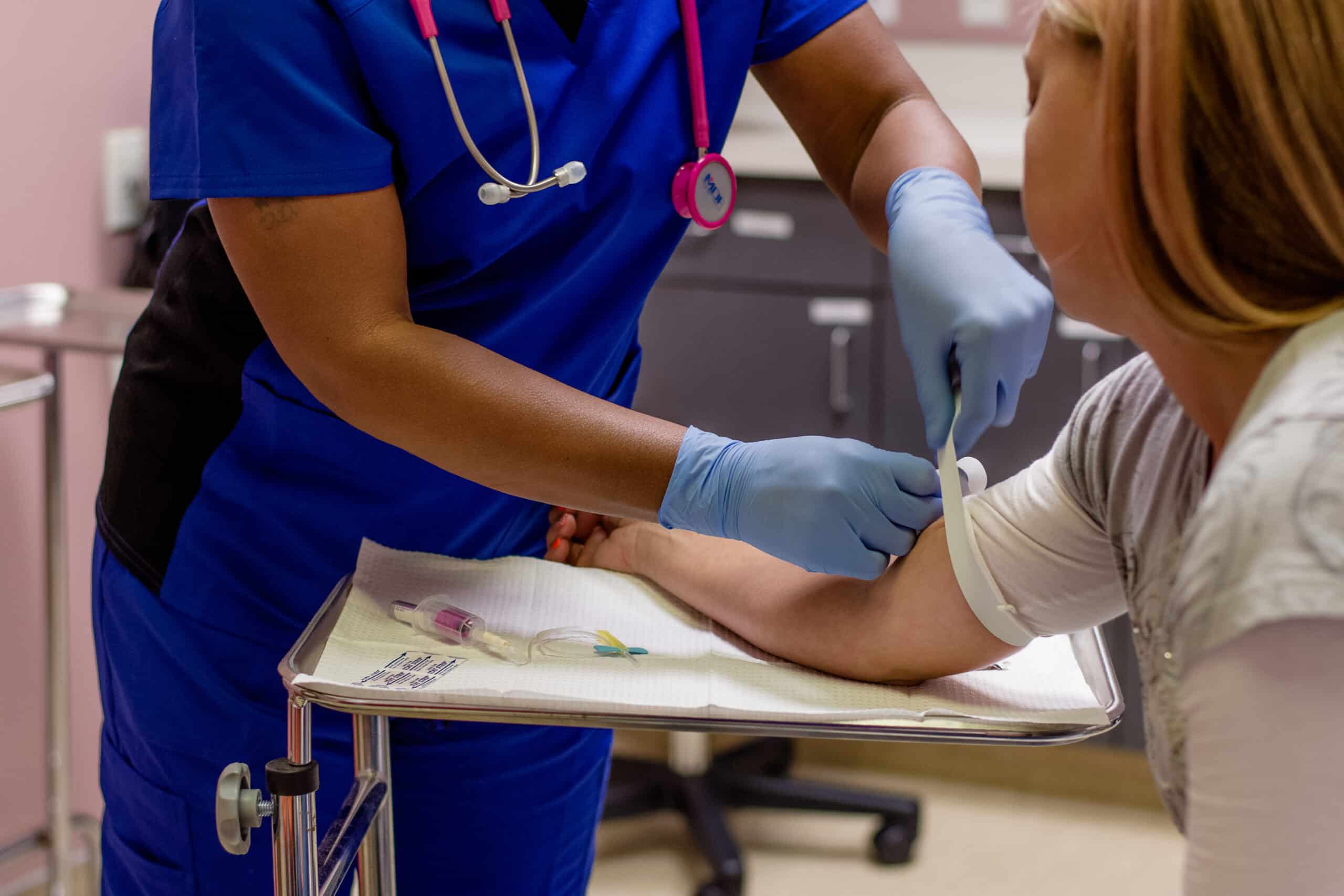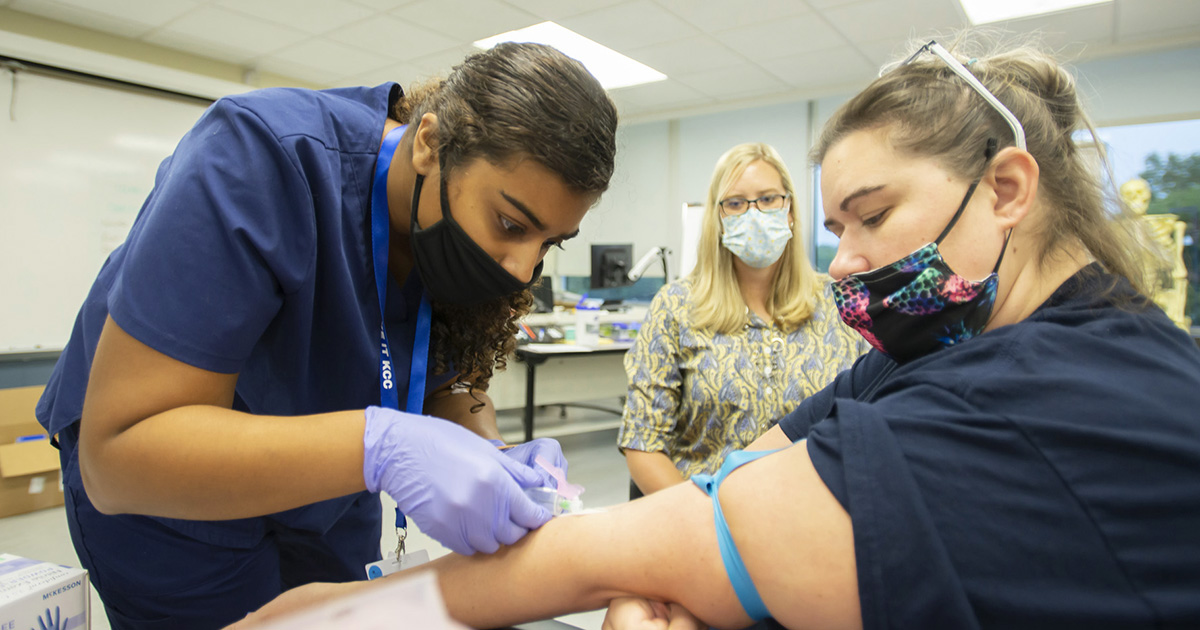Phlebotomy Courses Near Me: Step-by-Step Application Process
Wiki Article
The Course to Accreditation: Recognizing the Phlebotomy Training Training Course Journey and Its Significance
As you take into consideration the course to accreditation in phlebotomy, it's essential to understand the role you'll play in medical care. Your training will certainly cover essential skills, from blood collection techniques to patient interaction.
The Duty of Phlebotomists in Healthcare
Phlebotomists play a vital function in the health care system, working as the vital web link between individuals and crucial diagnostic screening. You'll carry out blood draws, making certain samples are gathered properly and safely. Your expertise helps in detecting medical conditions, keeping track of health, and guiding therapy choices.In your everyday interactions, you'll need to establish trust fund with individuals, making them really feel comfy during what could be a difficult experience. You're liable for identifying and dealing with examples very carefully to stop contamination or mistakes, which could impact test results.
Past this, you'll often work together with doctors and registered nurses, communicating vital information concerning people' problems. By mastering your skills, you add meaningfully to individual treatment, making you a crucial part of the clinical team.
Summary of Phlebotomy Training Programs
When discovering phlebotomy training programs, you'll locate various kinds made to fit different timetables and finding out designs. Each program aids you create necessary abilities like blood collection and individual interaction. Comprehending these choices is vital to choosing the ideal path for your job.Sorts Of Educating Programs
Numerous types of training programs are readily available for those looking to become proficient in phlebotomy. Furthermore, some hospitals and facilities offer on-the-job training programs, supplying practical experience while you discover. Whatever course you select, each program intends to equip you with the needed skills for an effective phlebotomy career.
Trick Abilities Developed
Grasping phlebotomy needs a collection of key skills that are created through complete training programs. You'll find out technological abilities like correct capillary selection, needle insertion, and blood collection strategies. These hands-on practices ensure you can execute treatments securely and successfully. Additionally, communication skills are fundamental; you'll need to communicate with clients, discuss procedures, and put them secure. Recognizing makeup and physiology is essential, also, as it aids you situate blood vessels and recognize the body's feedback to blood attracts. You'll obtain expertise of safety and security protocols and infection control, guaranteeing you maintain a sterile setting. Each of these abilities is crucial for your success as a qualified phlebotomist, making you a useful possession in any healthcare setup.Key Elements of a Phlebotomy Course
In a phlebotomy training course, you'll focus on vital subjects that lay the foundation for your future career. You'll involve in hands-on training that allows you to use what you've found out in real-world settings. Both the curriculum and useful experience are essential for your success as a phlebotomist.Curriculum Review
While pursuing a phlebotomy training program, you'll experience a curriculum developed to outfit you with basic abilities and understanding. Phlebotomy Training Course. This curriculum usually consists of anatomy and physiology, concentrating on the circulatory system and recognizing blood components. You'll also find out about various types of blood collection techniques, consisting of venipuncture and capillary puncture methodsFurthermore, infection control and safety and security methods are essential parts, ensuring you know exactly how to keep a sterile setting. You'll examine patient communication, stressing communication and compassion, which are essential for relieving patient anxiety. Honest and legal considerations will certainly be attended to, preparing you for real-world duties. This fundamental expertise will certainly allow you to succeed as a phlebotomist and give top quality treatment in professional settings.
Hands-On Training Experience
Obtaining hands-on experience is a crucial component of your phlebotomy training course. This useful training allows you to use what you have actually learned in a real-world setting, boosting your abilities and confidence. You'll practice venipuncture strategies, discover exactly how to handle various kinds of specimens, and obtain aware of the devices utilized in the field. Under the guidance of seasoned trainers, you'll refine your abilities, guaranteeing you're prepared for any kind of circumstance you might encounter.Additionally, you'll get the chance to engage with patients, which is crucial for establishing your interaction skills. This mix of technical efficiency and social skills is important for your success as a certified phlebotomist. Inevitably, hands-on training is where theory satisfies technique, solidifying your expertise and readiness for accreditation.
Qualification and Licensing Requirements
Prior to you can begin your occupation in phlebotomy, it is essential to recognize the accreditation and licensing needs that vary by state. Many states call for phlebotomists to hold a certification from an acknowledged company, such as the National Phlebotomy Organization or the American Society for Scientific Pathology. These qualifications generally entail passing an examination that examines your knowledge and abilities in the area.Along with certification, some states have specific licensing needs. You may require to finish a particular number of hours in clinical technique, send evidence of training, or go through a history check. It is essential to research your state's regulations to make sure you meet all needed criteria.
Staying notified concerning these needs not just aids you safeguard a position but also enhances your integrity as a professional. By satisfying these requirements, you'll be well on your method to a successful profession in phlebotomy.
Hands-On Training and Practical Experience
Hands-on training and useful experience are vital elements of your phlebotomy education and learning, as they permit you to use academic understanding in real-world circumstances. During your training, you'll take part in supervised venipuncture, learn correct strategies, and come to be acquainted with various blood collection equipment. This straight participation is important for developing your confidence and honing your abilities.You'll function carefully with skilled professionals that can assist you with the nuances of client communication and example handling. Each method session not only enhances your understanding however also prepares you for the busy setting of health care settings.
In addition, numerous programs incorporate professional rotations, allowing you to experience varied settings, from medical facilities to outpatient facilities. This direct exposure helps you adjust to different obstacles and individual needs, guaranteeing you're well-prepared for your future role. Welcome these opportunities, as they're important to ending up being a skilled and thoughtful phlebotomist.
Difficulties Encountered During Training
While gaining hands-on experience is vital, it's vital to recognize the difficulties that can develop throughout your phlebotomy training. Additionally, grasping the abilities needed for blood attracts takes practice; you might battle with strategy initially.Time management can likewise be an obstacle, as harmonizing concept, practical sessions, and personal commitments can feel challenging. You may deal with varying finding out rates amongst your peers, leading to feelings of self-doubt if you think you're falling back. Finally, adapting to the different personalities of trainers can be difficult, as each may have a distinct training design.
Identifying these challenges early can prepare you for success and assist you establish durability throughout your training journey.
Job Opportunities After Certification

As you acquire experience, you could even consider focusing on areas like pediatric or senior citizen phlebotomy, catering to particular individual demands. Some phlebotomists pick to advance their occupations by ending up being laboratory professionals or pursuing additional education in health care areas.
In addition, your certification can cause functions in training or supervising new phlebotomists, permitting you to share your expertise. With the healthcare market consistently expanding, your skills will certainly always be in demand, leading the method for a steady and fulfilling career. Accept the possibilities waiting for you!
Often Asked Inquiries
What Is the Typical Duration of a Phlebotomy Educating Program?
Phlebotomy training programs generally last around four to 8 weeks. You'll take part in hands-on practice, class instruction, and on the internet Phlebotomy Courses Near Me understanding. Finishing this training prepares you for certification and a gratifying occupation in medical care.Are Online Phlebotomy Courses Available?
Yes, online phlebotomy courses are available. They provide versatility and ease, permitting you to research at your own pace. Just verify the program is certified to satisfy accreditation demands and get useful abilities for your occupation.Just How Much Does Phlebotomy Training Commonly Price?
Phlebotomy training typically costs in between $700 and $2,500, relying on the program and area. You need to take into consideration aspects like training course size, included materials, and hands-on experience when choosing the right training for you.What Are Common Requirements for Phlebotomy Training?
Usual prerequisites for phlebotomy training frequently consist of a high institution diploma or GED, immunizations, and a history check. Some programs may also need standard healthcare expertise or qualifications, ensuring you're planned for hands-on training.Can I Work While Completing My Phlebotomy Training?
Yes, you can function while completing your phlebotomy training. Several trainees equilibrium jobs with their researches, yet make sure to manage your time properly to ensure you fulfill both work and training dedications effectively.Report this wiki page